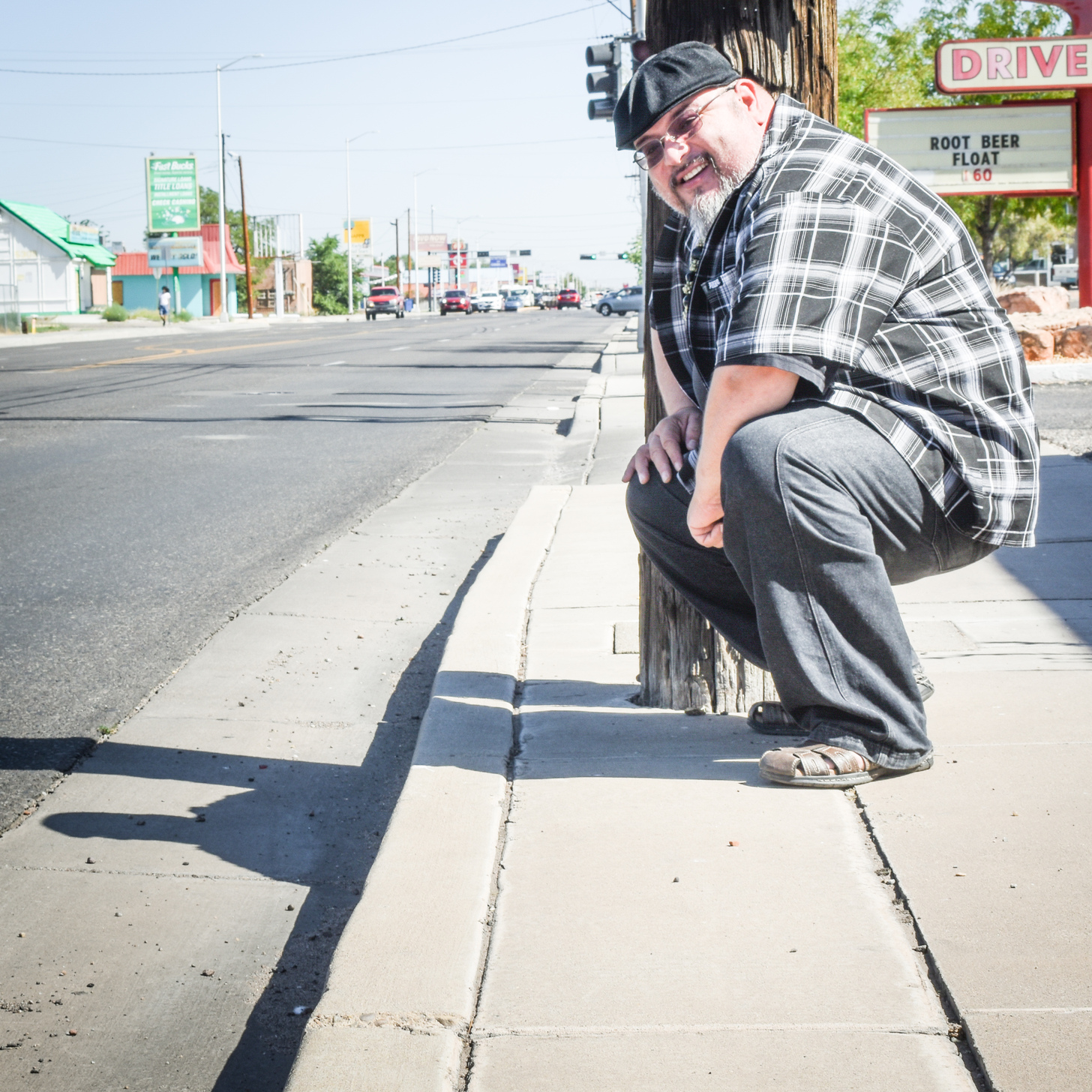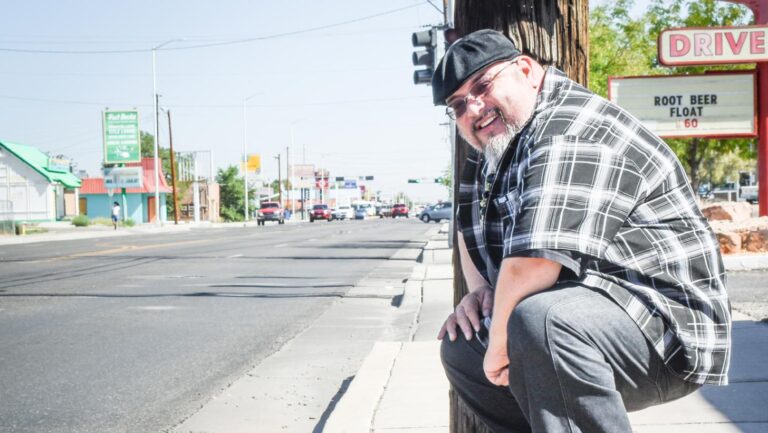Manuel González is the kind of poet who gets more animated the more he talks about the healing powers of poetry. Not simply the poems themselves, but the community that develops when poets come together to speak the truth as they see it and to let go of the words that have been holding them back. It is clear that he likes nothing better than to help those who have never considered putting their thoughts on paper discover the words they need to heal themselves. His second book, Om Boy (Swimming with Elephants Publications), came out last month. It is a reflection of a more seasoned poet, still very much of Albuquerque, but now toughed not simply by the New Mexican sun, but by the sort of self-work that makes one truly stronger. Weekly Alibi sat down with Manuel González to talk about truth, beauty and his new book. The following is an edited version of that conversation. Weekly Alibi: You were the Albuquerque Poet Laureate for two years. What rhymes with Albuquerque? Manuel González: That one’s always hard. We can just go on the sideways with words like turkey and then make up words that don’t actually exist. Why does Albuquerque have such an abundance of poets? Are there as many poets in Denver or Phoenix? Every major city in the country has its own little poetry community where we all kind of recite poems to each other. There’s like an underground railroad kind of couch-surfing where you can go from city to city to city and there’ll be somebody in that city that’ll put you up on their couch to let you feature at a poetry event till you make enough money to go to the next city. Those are fun things I did when I was young, but now I think Albuquerque is so abundant with good poetry because we have such an inviting and nurturing scene. When somebody new comes into a poetry reading, as soon as they walk off the stage, they’re greeted by five or six people telling them they did a good job and to come back and we like what you did. We try to help each other out in that way and help each other out through performance workshops that we do with each other and writing workshops that we do with each other to kind of help us to hone our craft in that way. What don’t people understand about that community? Before I was into a poetry scene, I had this idea of poets being this pretentious, very elitist academic. Like something that you had to have gone to school to study. So, my little notebook and my little journal where I wrote my own poems in private were something that I would never want to show anybody because they weren’t this ivory tower of academia. But once I got into it and started performing my work and meeting other poets—most of us are walking this road to heal ourselves because we found that this art form can be medicine in that way. Because inherently poetry is introspective and vulnerable, we got to really get to know each other just for those three minutes when they’re on the stage. Somebody will get up and bare their soul and you can tell that they need a hug. So, I’ll be the first one to go hug them. You get to have those connections in that way. Those beautiful, intimate moments that we have with our friends that we share who we are in an authentic and genuine way. It fosters that community like that. How is this book different than your first one?My first book was just a collection of all the spoken word pieces that I have been writing and the stuff that I had really tried hard to make myself look good. This book is different because I have come into the philosophy, like I just said, that poetry is medicine so I don’t get up and recite a lot of the heartbroken and painful poetry that I write sometimes. For the first time, I published some of it and it’s not always pretty. Sometimes it’s full of tears and crying. But it’s real. I think when we see each other start to heal in that way and work through our own issues and problems and emotions like that, it helps to heal other people, or at least give them the inspiration to start healing themselves in that way. So, the difference between this one and that one is this one’s a little bit more personal and real. It’s like I told the truth.What’s the connection between truth and beauty? I think beauty can be found everywhere and you just have to know. You just have to look deeper and keep searching until you find it. Keep scratching until it’s there. I think truth is inherently beautiful because even though everybody says it’s either true or false, we get to decide what our truths are, so to stand up and speak to what we see as true in the world and the beauty that we find there can be cathartic and healing. Not only that, it helps us appreciate who we are, where we come from and the beauty all around us all the time. How can you help people perceive your voice when they’re reading your poetry? I think it’s inherently written into the poems. One of the things in poetry are line breaks and they can be really arbitrary. It’s just up to the artist when they want to break the line to go to the next line. I mean, Emily Dickinson used to put little weird little dashes at the end of her lines. Yeah. As a spoken word artist, I break my lines where I’m going to take a breath. Yeah. It’s like a sentence, and then I take a breath, and then go to the next line. So, as you’re reading, that makes it the rhythm of my speeches. Then a lot of the words that I use are New Mexico words and dialect that we use from here. I’ll write eeeee into a poem and people from here know what it is. I travel around and sometimes I have to stop and explain things, but it helps show the world who we are. One time I got to travel to Wisconsin and brought a green chile and a lighter. I got on stage until it started to burn. I said, “This is what New Mexico smells like in the fall.” I’ve never heard someone say, “I got to travel to Wisconsin” before. Do you prefer performing, teaching or writing? I think what I do is do what I love for a living. I love facilitating the writing workshops where we sit together, write down something authentic and sincere, and then cry with each other and hug each other until we’re done. I love the performance. When I’m on the stage, sometimes there’s a moment where time almost stops and it’s like I’m speaking to each audience member, like directly to them, and we go on that journey together. I think that’s beautiful magic. I love to go into schools. When you see one of those kids that doesn’t talk, that sits quietly by themselves, that’ll fill a whole page. I get to go up to them and tell them, “Check you out. You wrote a whole page.” And they look at me inquisitively or suspiciously. But then when they start to share that, it’s like the knots that are tied up in their heart begin to untie onto the page. For the first time, they get to stand up and say who they really are. You see the other classmates start to see them in a different light. It’s like a beautiful thing. I get spoiled. Sometimes, I get angry if I can’t make it at least two kids cry in a classroom and I expect it, I’m ready for it. Especially here in Burque, these kids are emotionally constipated and sometimes all they need is somebody to open the floodgates for them and tell them it’s appropriate and okay for you to feel, now write it down. Is the healing of poetry in the writing or the speaking? Both. First, it’s the getting out and untying of the knots that are in our hearts. Once we write that stuff down and make sure that we’re authentic and real with it, cause that’s the hard part is you got to tell the truth to yourself, bro, telling the truth about what you believe about the world is easy. That was my first book. I told everybody, you know, I’m down to be Chicano and this is what it is to be from New Mexico. This one was looking within myself and trying to figure out why I feel the way I feel and the issues that I got to struggle with. After I wrote all that stuff down, standing up and reciting it is healing for me. To just claim my identity and to [have] accepted [myself] as being okay and to have those scars on my heart in that way. When a poet gets up on the stage and says something that is exactly what I need to hear exactly at the moment that I need to hear it, that inspires me to go get a pen now, not later, but now. Sometimes we scribble poems on bar napkins in that way. The sharing of the art in that way helps inspire other people. It’s like a disease that we spread like that.
Find Manuel González on stage at
Burque Revolt's One Year Anniversary
Thursday, Sept. 5, 6:30pm
Canvas Artistry
3120 Central Ave. SE










